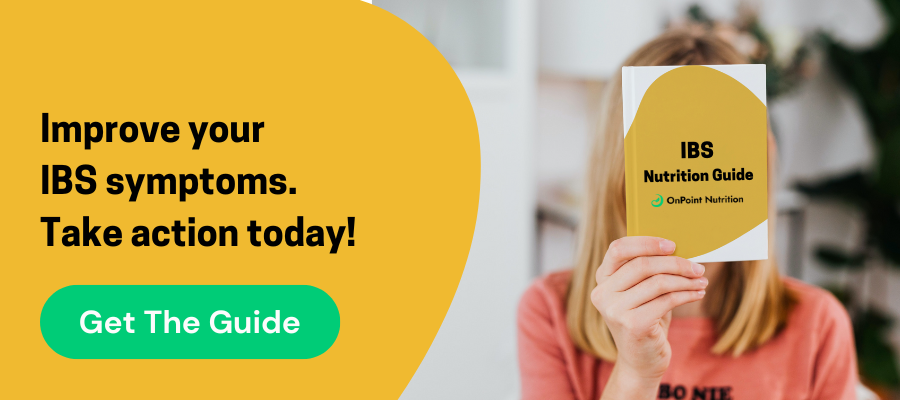
Although there is no “cure” for IBS, there are many effective treatment methods, all of which aim for long-term symptom management. Modern medicine has developed prescription drugs that can help alleviate your IBS symptoms, but we recommend starting with natural remedies such as diet therapy and mindfulness practice Read below for more details on IBS treatment.
How Doctors Treat IBS
If you’ve received an IBS diagnosis from your doctor, they will most likely recommend you see a dietitian to help with diet therapy. However, in severe cases, doctors may recommend prescription or over the counter medication to use in conjunction with diet therapy. Read more about medications commonly used for IBS below.
Prescription Medications for IBS
- Lubiprostone (Amitiza)
- Used for: IBS-C (https://blog.onpoint-nutrition.com/weightlossblog/what-is-ibs-c)
- Helps treat: abdominal pain, stool consistency, straining, and constipation.
- Side Effects: nausea, diarrhea, and abdominal pain.
- Alosetron (LOTRONEX)
- Used for: Women with severe IBS-D
- Helps treat: diarrhea
- Side effects: severe constipation and ischemic colitis
- TCAs-Tricyclic antidepressants (Amitriptyline (Elavil))
- Used for: IBS-D
- Helps treat: hypersensitivity, pain, rapid motility and secretion
- Side effects: drowsiness
- SSRIs- Selective Serotonin Reuptake Inhibitors (Sertraline (Zoloft))
- Used for: IBS-C
- Helps treat: slow colon transit
- Side effects: drowsiness
- Rifamaxin (Xifaxin):
- Used for: SIBO (small intestinal bacterial overgrowth)
- Helps treat: pain and diarrhea associated with overgrowth of bacteria in the small intestine
- Side effects: nausea, constipation
- Dicyclomine(Bentyl):
- Used for: IBS-D
- Helps treat: painful bowel spasms
- Side effects: constipation
Over-the-Counter Medications for IBS
- Loperamide (Imodium)
- Used for: IBS-D
- Helps treat: diarrhea ()
- Side effects: constipation
- Polyethylene glycol 3350 (MiraLAX):
- Used for: IBS-C
- Helps treat: constipation
- Side effects: nausea, cramping, gas
- Fiber supplements (Psyllium)
- Used for: IBS-C
- Helps treat: constipation
- Side effects: abdominal pain, cramping, gas
- Probiotics (predominantly Bifidobacterium infantis)
- Used for: All IBS subtypes
- Helps treat: abdominal pain, bloating and irregular bowel movements
- Side effects: temporary increase in gas, bloating, constipation, and thirst
How Dietitians treat IBS
When looking for information on any healthy diet, the internet can be confusing and contradicting. This is especially true for IBS, as each case is different. An IBS dietitian is well-versed in the current research surrounding IBS treatment and management. They utilize their knowledge to help you pinpoint your triggers and create sustainable eating habits while also accounting for nutritional adequacy. Our dietitians utilize the treatment process outlined below:
- Nutrition assessment: The first step a dietitian will take towards IBS management is to collect a detailed diet and medical history to evaluate known food intolerances, symptoms, and quality of life. This allows the dietitian to determine what approach is best suited for the client to help with trigger identification.
- Identification of triggers: There are several methods to identify triggers: symptom tracking, elimination diet, and a modified elimination diet. The path that your dietitian will decide to use to depends on your IBS symptoms, medical history, and lifestyle. Symptom tracking is the first step in identifying triggers and it involves keeping a detailed food and symptom log. This allows the dietitian to draw correlations between food patterns and symptoms to help identify food triggers. Elimination diets, on the other hand, are much more restrictive and involve eliminating all potential food triggers from the diet and slowly adding them back in to determine triggers. Elimination diets can also be modified by the discretion of the dietitian to allow more flexibility for people who find doing a full elimination diet difficult or if lifestyle factors prevent the diet from being followed traditionally.
- Individualization: After discovering what foods and behaviors trigger your symptoms, your dietitian will determine how to best meet your nutrient needs while also avoiding triggers. While food is a large piece of IBS management, long-term symptom relief may also involve mindfulness practice to alleviate any symptoms caused by mental distress. We have also included a probiotic regimen for clients with IBS.
Other effective treatment options
- Gut-directed hypnotherapy: Gut directed hypnotherapy is a type of hypnosis that targets the brain-gut connection. The practitioner uses metaphors during hypnosis to target improved GI symptoms and perceived pain. A common metaphor involves asking the client to imagine swallowing a pill known to improve GI function. The subject would then envision the medicine protecting them against abdominal pain, bloating, abnormal bowel habits, or any function of their IBS that has been difficult to manage.
- Cognitive behavioral therapy: CBT is a type of psychotherapy that aims to educate the client on the stress-gut connection, gain understanding of the individual’s cognitive and behavioral responses to IBS symptoms, and modify those responses.
- Mindfulness practice: Mindfulness-based therapy is an effective approach to relieving anxiety, depression, stress, and pain. It also helps with overall relaxation and improved self-esteem. Since these psychological components are so strongly connected to gut health, the effects of mindfulness practice tend to subsequently improve IBS symptoms. Types of mindfulness practice include yoga, tai chi, and meditation.
IBS has no cure, but thankfully there are plenty of treatment options for symptom management. For best results, we recommend surrounding yourself with a healthcare team that can help with each facet of IBS management- clinical, dietary, and psychological. The key to long-term IBS management is finding the treatment method or combination of methods that work best for you.
To read more about foods to avoid, foods to eat, and how to make easy changes to your IBS diet to mitigate your symptoms, download our IBS Nutrition Guide.
Topics

Kaitlyn Willwerth is a Registered Dietitian at OnPoint Nutrition. Kaitlyn's work focuses on providing individualized health and lifestyle coaching and, most importantly, support. She is a Certified LEAP Therapist and has also completed the Monash University 'Low FODMAP Diet for IBS' online training course for health professionals.




